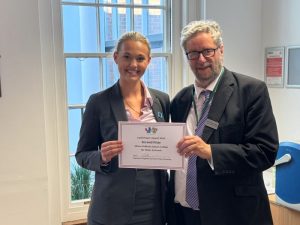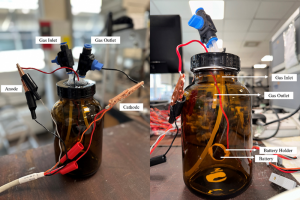Cruise industry giants have teamed up with three colleges to highlight the sector as an exciting, rewarding career pathway for school leavers. This included 12 Travel and Tourism students at Nescot college in Ewell, who have just completed their first Cruise Career Springboard programme, allowing them to dip their toes into a potential career in the cruise sector by visiting several incredible ships, hearing from industry leaders and seeing head office and shoreside roles in action.
The Cruise Career Springboard programme was developed and masterminded by Edwina and Matthew Lonsdale at Mundy Cruising and has been supported by key industry figures, who have come together to invest in the next generation. This includes representatives from the Cruise Lines International Association (CLIA) and leaders from numerous operators including Royal Caribbean, Celebrity Cruises, Silversea, Norwegian Cruise Line, Oceania, Regent Seven Seas, Cunard, P&O, Princess, Seabourn, MSC Cruises, HX Expeditions, Uniworld, AmaWaterways, Windstar and Viva. Former Managing Director and Vice President of Celebrity Cruises, Jo Rzymowska, an inspirational speaker and Non-Executive Director at Hays Travel joined the programme to mentor the Nescot students. Participants have also benefited from the wisdom of former Managing Director of Regent Seven Seas Cruises UK, Graham Sadler, and Debbee Dale, leading trainer for the sector.
The course, which took place over nine weeks and included students from St John Bosco College in Battersea and Itchen College in Southampton, also aims to improve diversity and inclusion, introducing learners from varied backgrounds to the wide range of on-board and shore-based opportunities. This could be anything from engineering to entertainment, HR to health and safety and destination management to deck duties.
This year the students visited six cruise ships and learnt about the product offer covering expedition, luxury, mainstream and river cruise liners. They also undertook classroom work, visited and heard about operations at company headquarters and prepared for a final presentation to industry professionals where they will pitch the opportunities for career pathways in the sector. Plans are already in place to embed the learning and experience into Nescot’s future delivery and to launch a Level 4 qualification in Travel & Tourism with a pathway in the cruise industry from 2026.
Julie Kapsalis, Principal and CEO at Nescot said: “This programme is very close to my heart as a cruise addict – I’ve recently returned from my latest fantastic adventure. It’s wonderful to share my love for this sector with my students. University isn’t always the right route for everyone at eighteen, particularly once the cost is factored in. With that in mind, we aim to be innovative at Nescot, working closely with businesses to show students there are other exciting options out there. This includes apprenticeships and entry level roles which can be inspiring and fun with exceptional progression pathways. The Cruise Career Springboard has offered once-in-a-lifetime experiences, expert mentorship and the chance to learn about and try roles beyond the course. It’s clear that the Cruise industry offers students a world of opportunity and we’re working together to help them grab it.”
Edwina Lonsdale, Managing Director of Mundy Cruising and Cruise Career Springboard creator said: “Many young people look at the cruise sector and don’t realise it could be a career option for them, so we set out to change that. We want a diverse, enthusiastic workforce, both at sea and shoreside so linking up with colleges made perfect sense. I’ve been blown away by the continued industry reaction and how many individuals and operators have come on board to help us. We’re incredibly grateful, as with their support, the Springboard programme can launch more careers than ever. I have also been struck by the enthusiasm and participation of the students – they have a great future ahead of them.”
Eva Williams, Travel & Tourism Student at Nescot said: “Nescot’s partnership with the Cruise Career Springboard programme has been amazing! We were so lucky to visit all the different ships and have big names in the industry chatting to us. I was genuinely surprised by how many people work behind the scenes to keep everything running – whole teams making things happen without ever stepping on deck. I’d never really considered the cruise industry as a career option before, but it’s definitely on my radar now. I love the idea of playing a part in helping people’s dreams come true.”
Working in the cruise industry allows young people to access a wide range of careers and utilise skills that cover a range of jobs and functions. As a global industry, it also offers opportunity to work with colleagues around the world and to travel. Many who join the cruise line industry might begin on ships, but then pivot into shore-based roles as their career develops, or family commitments make travel more difficult. The industry can provide a lifelong, varied and dynamic career.
Industry professionals interested in finding out more about the Cruise Career Springboard can contact Edwina Lonsdale – edwina@mundycruising.co.uk
In addition to Travel and Tourism courses, Nescot offers a wide range of college courses for school leavers and adults, including Animal Care, Business, Computing and IT, Construction, Performing Arts, Childcare, Health & Social Care and Beauty Therapy. To find out more about studying at Nescot call 020 8394 3038, visit www.nescot.ac.uk or email adviceteam@nescot.ac.uk
Image: Students from Nescot, St John Bosco and Itchen Colleges are joined on Silver Spirit by Edwina Lonsdale – Mundy Cruising, Mentors Graham Sadler and Jo Rzymowska, Peter Shanks – Silversea Cruises and Julie Kapsalis – Nescot.











